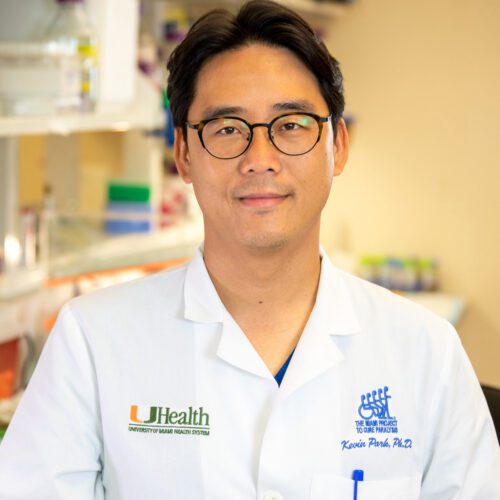Kevin Park, Ph.D.
Professor, Department of Neurological Surgery

The Miami Project to Cure Paralysis
1095 NW 14th Terrace (R-48)
Miami, FL 33136
Biography
Research Interests
Areas Of Research
Publications
More
Kevin (Kyung) Park, Ph.D. is a Professor at The Miami Project to Cure Paralysis in the Department of Neurological Surgery, Director of the Viral Vector Core at the University of Miami Miller School of Medicine. He received his undergraduate degree in 2001 from the University of Western Australia, with an honors thesis conducted in the laboratory of Dr. Bruno Meloni, investigating the effects of hypoxia in cultured neurons. In 2007, he received his doctorate degree in Anatomy and Neuroscience under the training of Dr. Alan Harvey and Dr. Qi Cui at the University of Western Australia, studying the molecular mechanisms of neuronal regeneration.
Dr. Park was a postdoctoral fellow at Children’s Hospital Boston at Harvard University with Dr. Zhigang He, determining the role of growth-controlling genes in regulating nerve repair. In 2010, Dr. Park joined the faculty at University of Miami Miller School of Medicine. Dr. Park is a recipient of numerous awards and honors including Pew Scholars in Biomedical Sciences (class of 2012) and E. Matilda Ziegler Award.
Axon Regeneration, Circuit Reassembly and Neuroprotection
My lab is interested in understanding the mechanisms that account for the failure of axon regeneration and the degeneration of neurons after injury and in diseases. Using in vivo animal models of nerve injury, my lab focuses on a number of important questions relevant to neural repair.
- What are the cellular and molecular mechanisms which regulate axon regeneration and neuronal survival after central nervous system (CNS) injury?
- Can regenerating axons form appropriate connections, re-establish neural circuits, and promote functional recovery in the CNS?
- Can we use combinatorial strategies to further improve axon regeneration and functional recovery?
Successful functional recovery after CNS injury requires multiple steps. First, axotomized neurons must remain healthy and viable in order to re-grow axons. Correct path-finding of regenerating axons into the distal target regions is important for proper functional outcomes. Regenerating axons require remyelination in order to convey efficient electrical signals. Sustained long distance axon regeneration seen after manipulation of distinct genes is providing opportunities to explore these questions and to ultimately probe for potential therapeutic interventions against paralyzing and neurodegenerative conditions.
Visit Dr. Park’s Publication Listing
News Stories
The Link Between Optic and Spinal Nerves (May 2022)
Nerve Regeneration Genes Discovered (October 2019)
Path of Axon Regeneration (August 2018)
Miami Project Receives NIH Grant to Study Axon Regeneration (September 2016)
Kevin Park, Ph.D. Publishes Manuscript on Axon Regrowth in the Adult Central Nervous System (April 2016)
New Axon Sprouting Research Findings Published (November 2014)
Dr. Kevin K. Park Selected as 2012 Pew Scholar (June 2012)
Miami Project Researcher Kevin Park Co-Authors Manuscript in Nature (December 2011)
PROFESSIONAL AFFILIATIONS/MEMBERSHIPS
Association for Research in Vision and Ophthalmology
Society for Neuroscience
Visit Dr. Park’s Laboratory Website
